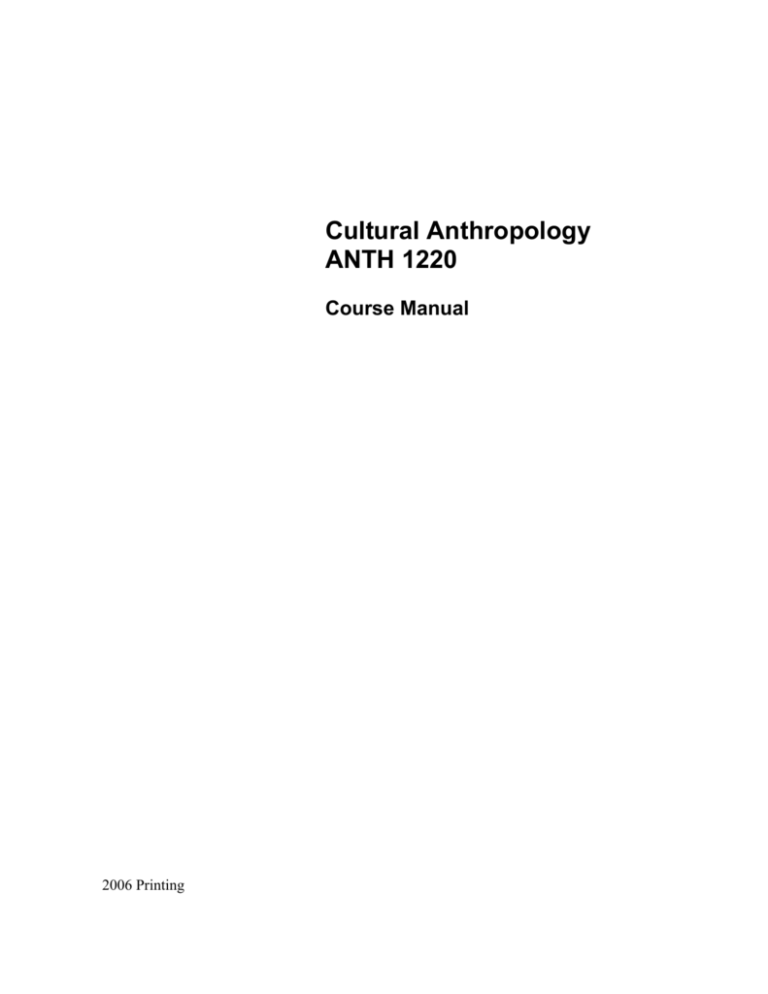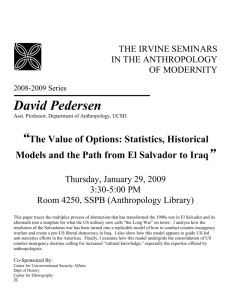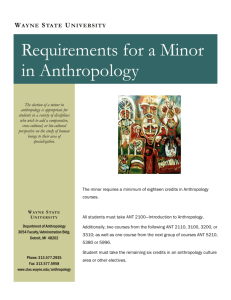
Cultural Anthropology
ANTH 1220
Course Manual
2006 Printing
Copyright © 1998. Revised 2001, 2003.
All rights reserved. No part of the material protected by this copyright may be reproduced,
stored in a retrieval system, or transmitted in any form or by any means, electronic or
mechanical, including photocopying, recording, or otherwise without the prior written
permission from the copyright owner.
University of Manitoba, Distance and Online Education
Acknowledgments
Content specialist:
Brian Schwimmer, Ph.D.
Department of Anthropology
Faculty of Arts
University of Manitoba
Instructional designer:
Bonnie Luterbach, M.Ed.
Distance and Online Education
University of Manitoba
Desktop publisher:
Cheryl McLean, M.Ed., Ph.D.
Distance and Online Education
University of Manitoba
Lorna Allard
Distance and Online Education
University of Manitoba
Editor:
(2001)
James B. Hartman, Ph.D.
Distance and Online Education
University of Manitoba
Table of Contents
Introduction to the Course ....................................................................1
Course description.........................................................................1
Course goals ..................................................................................2
Course materials............................................................................2
Going online..................................................................................3
Evaluation and grading..................................................................4
Course at a Glance..................................................................................9
Unit 1
Introductory Overview: Concepts, Methods,
and Theories ...........................................................................11
Unit 2
Language and Culture...........................................................37
Unit 3
Subsistence Systems...............................................................57
Unit 4
Kinship and Social Organization .......................................101
Unit 5
Social Divisions and Hierarchies ........................................177
Unit 6
Economy ...............................................................................191
Unit 7
Politics...................................................................................213
Unit 8
Ritual and Religion ..............................................................231
Glossary ...............................................................................................245
Answers to Study Questions ..............................................................254
Assignment Title Sheets .....................................................................268
Introduction to the Course
Course description
The Undergraduate Calendar of The University of Manitoba describes ANTH
1220 as follows:
The comparative study of human societies and cultures, including language,
economic and political organization, family and kinship, ritual and belief systems,
cultural stability and change. Students may not hold credit for ANTH 1220 (or
076.122) and any of: ANTH 1221 (or 076.122), ANTH 1520 (or 076.152), or the
former 076.120.
This course will provide you with a basic introduction to cultural anthropology
and will broadly survey the central concepts, theories, and empirical findings of
the subdiscipline. We will cover the major subfields of cultural anthropology
with an emphasis on the comparative study of contemporary cultures. Over the
next few months you will learn to understand and appreciate the wide array of
cultural differences that have developed throughout the world and gain new
insights into the patterns and dynamics of your own cultural traditions.
Anthropology literally means the study or science of the human race and,
accordingly, falls within the social sciences. It treats all aspects of human
experience, thought, and behaviour in every part of the world from our origins to
the present day. Thus our interests include and cut across those of economics,
political science, psychology, sociology, and many of the humanities and natural
sciences as well. The general breadth of subject matter encourages quite a
diversity of research activities, but all anthropologists are united by a unique
common framework of theory and method. We understand human behaviour,
institutions, and beliefs from the perspective of the culture concept. (Culture is
understood as the learned body of knowledge, belief, and custom that people use
to organize their natural and social environments.)
The diverse subject matter of anthropology is divided into four subdisciplines:
physical anthropology, cultural anthropology, archaeology, and linguistics.
Cultural anthropology deals with cultures of contemporary peoples and attempts
to record and explain cross-cultural regularities and variations. Cultural
anthropology is further subdivided by specialization and theoretical orientations
that focus on specific institutional subsystems—social organization, subsistence,
economy, politics, and religion—each of which will constitute a unit within this
course.
Cultural Anthropology
ANTH 1220
1
Subdisciplines and specialization within Anthropology
Holistic
Comparative
Time
Depth
Scope
Anthropology
Central
concept
Culture
Sub disciplines
Physical
anthropology
Cultural
anthropology
Archaeology
Linguistics
Human evolution
Human variation
Primatology
Cultural ecology
Social anthropology
Economic anthropology
Political anthropology
Anthropology of religion
Prehistory
Phonology
Morphology
Semantics
Historical linguistics
Sociolinguistics
Course goals
The instructional content, readings, and assignments for this course are designed
to give you an overview of the whole subdiscipline of cultural anthropology and
its specializations. You will be provided with the resources and skills to:
•
define and describe the main principles of the anthropological description and
analysis of human behaviour and culture including:
- central concepts widely used in the discipline,
- technical terms used for formal description of cultural institutions,
- basic ethnological (theoretical) schools;
•
apply anthropological concepts and theories to specific ethnographic
(cultural) examples and case studies;
•
evaluate competing theoretical positions;
•
develop “cultural sensitivity,” a knowledge and appreciation for the
complexities and values of cultural orientations other than your own;
•
view and evaluate your own cultural background from a comparative
perspective; and
•
pursue more advanced and specialized courses in cultural anthropology.
Course materials
The following required materials are available for purchase from the University
of Manitoba Book Store. Please order your materials immediately, if you have
not already done so. See your Distance and Online Education Student Handbook
for instructions on how to order your materials.
2
Required texts
Bates, Daniel G., and Fratkin, Elliot M. (2003). Cultural anthropology (3d ed.).
Allyn and Bacon.
Heider, Karl. (1997). The Grand Valley Dani: Peaceful Warriors (3d ed.). Fort
Worth: Harcourt Brace College Publishers.
The Bates and Fratkin text is devoted to a full survey of the concepts, subfields,
and comparative findings of cultural anthropology.
The Heider text is an ethnographic case study, which is to be read in conjunction
with the general text to give detailed empirical illustration of the main points and
concepts.
The Distance and Online Education Student Handbook
The Distance and Online Education Student Handbook is located online in each
course site and on the Distance and Online Education website. You can
bookmark the site for easy access at your convenience. If you need to order a
printed copy, please consult your Distance and Online Education Guide staff
directory for the general inquiries contact information.
Accessing both the Handbook and the DE Guide throughout the year provides
you with detailed information regarding the management/administrative aspects
of this distance education course. The Handbook tells you how to access the
following:
•
•
•
•
•
•
•
Your instructor;
Writing your final exam at a location other than the University of Manitoba
campus;
Distance and Online Education Student Services;
Using technology (online access, communication tools);
The University of Manitoba Libraries;
Information on ordering your course materials through the University of
Manitoba Book Store; and
Information on accessing your grades and submitting assignments online.
Going online
Interacting with other students
Take advantage of communication tools in the course website. The tools include
e-mail, discussion, and chat. Post your questions or comments in the discussion
area. Activities such as these provide other students with an opportunity to
interact with you. Consider creating online study groups.
Interacting with your instructor
Questions? Concerns? Discussion? Your instructor is prepared to assist you. Do
not hesitate to address any concerns regarding the course and assignments
Cultural Anthropology
ANTH 1220
3
directly with your instructor. Check your instructor’s contact information to
determine how best to communicate—not all instructors communicate online.
Using the Libraries
Additional readings enrich your learning experience and your understanding of
your course topics. Textbooks and course materials often contain suggested
reading lists, and you can search any library, using online library search tools, to
find these and other related materials.
Evaluation and grading
You should acquaint yourself with the University’s policy on plagiarism,
cheating, and examination impersonation as detailed in the General Academic
Regulations and Policy section of the University of Manitoba Undergraduate
Calendar. Note: These policies are also located in your Distance and Online
Education Student Handbook or you may refer to Student Affairs at
http://www.umanitoba.ca/student.
Assignments
You will be required to submit five short assignments for this course; they offer
the advantage of ensuring that you do not let too much of a workload accumulate
and that you receive frequent feedback about your progress. There are seven
possible choices listed below, of which you are to choose five. Please submit
your assignments by the due dates listed below. Each assignment should be
approximately 500 words, or two double-spaced, typewritten pages in length.
Assignment topics
4
•
Assignment 1
Unit 1 Introduction, Section 2.2: Research Methods
Consider Heider’s entry into Dani culture and his other fieldwork experiences as
examples of ethnographic data-gathering methods in anthropology. Describe and
evaluate his ethnographic approach in light of the techniques, issues, and
problems of fieldwork discussed in readings and lectures. The relevant passages
are to be found on pp. 3-19 of The Grand Valley Dani. You should be
particularly concerned with the sources of bias that may have affected the
objectivity and accuracy of his reporting as discussed in section 2.2 of this unit.
•
Assignment 2
Unit 2 Language and culture
What particular insights into Dani culture can you gain from a knowledge and
analysis of their language? Be sure to identify the aspect of language that is
appropriate to your illustration (morphology, semantics, or sociolinguistics) and
to discuss your observations in respect to the theories of language and culture that
we have been considering.
•
Assignment 3
Unit 3 Subsistence systems
Dani subsistence is based upon a system of cultivation that depends upon
irrigation, a form of agricultural intensification.
1. What social institutions are usually correlated with this subsistence base?
(See Intensive agriculture: Sociocultural correlates.)
2. Does Dani culture incorporate these institutions as anticipated?
Are there other aspects of Dani culture and society that can be explained by
their subsistence patterns?
•
Assignment 4
Unit 4 Kinship and social organization
Identify the main kinship groups (other than the household) that are important
for the Dani and describe the social, economic, political, and religious
functions that they organize.
(Clue: In carrying out this assignment you should consider that there may be
other principles of social organization other than kinship that may be significant
in structuring Dani life. In assessing kinship, keep in mind the possible
importance of these non-kinship structures and the range of functions they
assume.)
•
Assignment 5
Unit 6 Economy
We have identified a number of exchange categories in the Dani economy,
including trade, prestige, warfare, and marriage payment.
1. Attempt to classify each specific exchange in terms of the basic forms
(generalized reciprocity, balanced reciprocity, negative reciprocity,
redistribution, and market exchange).
2. Associate these processes with the basic order of Dani society according
to the following table:
Can you make the same kind of correspondence between forms of exchange and
social distance that we have applied to the Yanomamö situation?
Form of
exchange
•
Social group
involved
Principle of
exchange
Marriage transfers
?
?
Prestige exchanges
?
?
Trade
?
?
Ritual warfare
?
?
Secular warfare
?
?
Assignment 6
Unit 7 Politics
Identify and describe the different forms of Dani warfare. Discuss different
theories that may account for each or both forms according to the various
Cultural Anthropology
ANTH 1220
5
positions presented by Heider and by Bates. Which theory do you prefer and
why?
•
Assignment 7
Unit 8 Ritual and religion
Identify and describe the basic characteristics of Dani religious belief and
practice, and explain them in terms of two separate theories of religion that we
have been considering.
Assignment title sheets are located at the back of the manual. Please note that
the title sheets included are pre-numbered from one to five for each assignment
submission. Fill in the number of your assignment choice in the space provided.
Final exam
The final examination will consist of 100 multiple-choice questions and will be two
hours in length. It will cover all the course material and will count for 50 percent of
your final grade. The examination date will be set by the Registrar’s Office.
General guidelines for assignment and exam preparation
A word of caution about the assignments and the final examination
Some students find that they do very well on the assignments, but they do not do
nearly as well on the final examination. While your grades on the assignments
will give you some idea of how well you are mastering the material, they may not
indicate how well you will do on the examination, because the examination is
written under very different circumstances. Because the assignments are open
book, they do not require the amount of memorization that a closed-book
examination requires nor are they limited to a specific time period. Some students
have told us that, based on the high marks they received on the assignments, they
were overconfident and underestimated the time and effort needed to prepare for
the final examination.
Please keep all this in mind as you prepare for the examination. If your course has a
sample exam or practice questions, use them to practice for the examination by setting
a time limit and not having any books available. Pay careful attention to the description
of the type of questions that will be on your final examination. Preparing for multiple
choice questions involves a different type of studying than preparing for essay
questions. Do not underestimate the stress involved in writing a time-limited
examination.
6
Assignment due dates and distribution of marks
Item
Value
Sept. - Dec.
Jan. - Apr.
May - Aug.
Assignment 1
10% Sept. 19
Jan. 15
May 14
Assignment 2
10% Oct. 3
Jan. 29
May 28
Assignment 3
10% Oct. 17
Feb.12
June 11
Assignment 4
10% Oct. 29
Feb. 26
June 22
Assignment 5
10% Nov. 12
Mar. 9
July 6
Assignment 6
10% Nov. 21
Mar. 21
July 16
Assignment 7
10% Nov. 30
Mar. 30
July 26
Note: only five of the above seven assignments are to be submitted.
Toward the end of the course the time between assignment due
dates is much shorter.
Final exam
Total
50%
100%
If you need to write the final exam at a location other than the University of
Manitoba main campus, you must complete an application. Please consult your
Distance and Online Education Student Handbook for directions.
Note: If the assignment due date falls on a Saturday, Sunday, or statutory holiday, it
will be due on the next working day. If the assignment due date falls during the
Mid-term Break in February, it will be due on the Monday following the Midterm Break. If you are unable to submit an assignment on time, contact your
instructor well in advance of the due date, for we cannot guarantee that the
instructor will accept late assignments.
Review the guidelines on assignment due dates in the Student Handbook.
Grading scale
Letter grade
A+
A
B+
B
C+
C
D
F
Percentage
90 – 100
80 – 89
75 – 79
70 – 74
65 – 69
60 – 64
50 – 59
49 and lower
Please note: All final grades are subject to departmental review.
Cultural Anthropology
ANTH 1220
7
Notes
8
Course at a Glance
Week
1
Unit
1. Introduction
2
3
Topics
1. The culture concept
2. Language and culture
1. Characteristics of human languages
4
Cultural Anthropology ANTH 1220
6
7
Assignment 1
due
Bates & Fratkin, pp.
55–84
Heider, pp. 25–66
4. Semantics
5. Sociolinguistics
6. Historical linguistics
3. Subsistence systems
1. Environment, technology, and culture: Analytical
perspectives
2. Foraging
3. Pastoralism
Assignment 2
due
Bates & Fratkin, pp.
85–269
4. Horticulture
5. Intensive agriculture
6. Industrial society
4. Kinship and social
organization
1.
2.
3.
4.
Introduction to kinship and social organization
Kinship systems overview
Kinship fundamentals
Kinship descent systems
Assignments
Bates & Fratkin,
Chapters 1 and 2.
Heider, pp. 1–23
2. Method and theory in cultural anthropology
2. Phonology⎯the sounds of language
3. Grammar
5
Readings
Assignment 3
due
Bates & Fratkin, pp.
271–305
Heider, pp. 67–90
9
10
Your course at a glance, cont’d.
Week
Unit
Topics
8
5. Kinship terminology
6. Marriage systems
9
7. Kinship residence rules
8. Nonkinship-based modes of organization
Readings
Assignments
Bates & Fratkin, pp.
271–305
Heider, pp. 67–90
Assignment 4
due
10
5. Social Distinction and
Hierarchy
1. Gender
2. Age
3. Wealth
Bates & Fratkin,
pp. 307–337
11
6. Economy
1. Introduction: Basic units and processes
2. Theories of economic behaviour
3. Systems of exchange
4. Spheres of the economy
Dani economic organization
Bates & Fratkin,
pp. 339–366
Assignment 5
due
12
7. Politics
1. Principles of political analysis
2. Political structures
Bates & Fratkin,
pp. 367–399
Heider, pp. 90–120
Assignment 6
due
13
8. Ritual and religion
1. Defining religion
2. Forms of religion
3. Theories of religion
Bates & Fratkin,
pp. 401–430
Assignment 7
due
Heider, pp. 121–152








